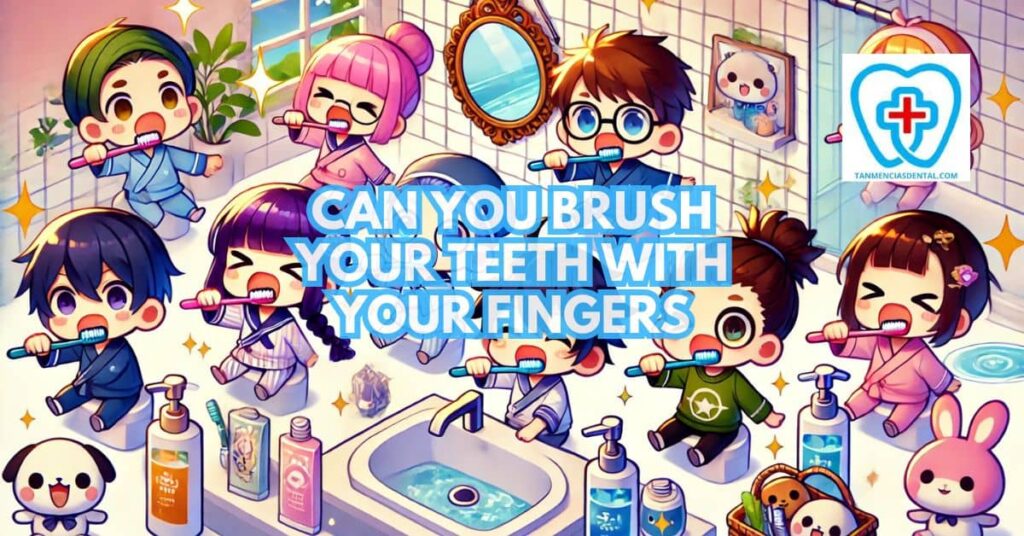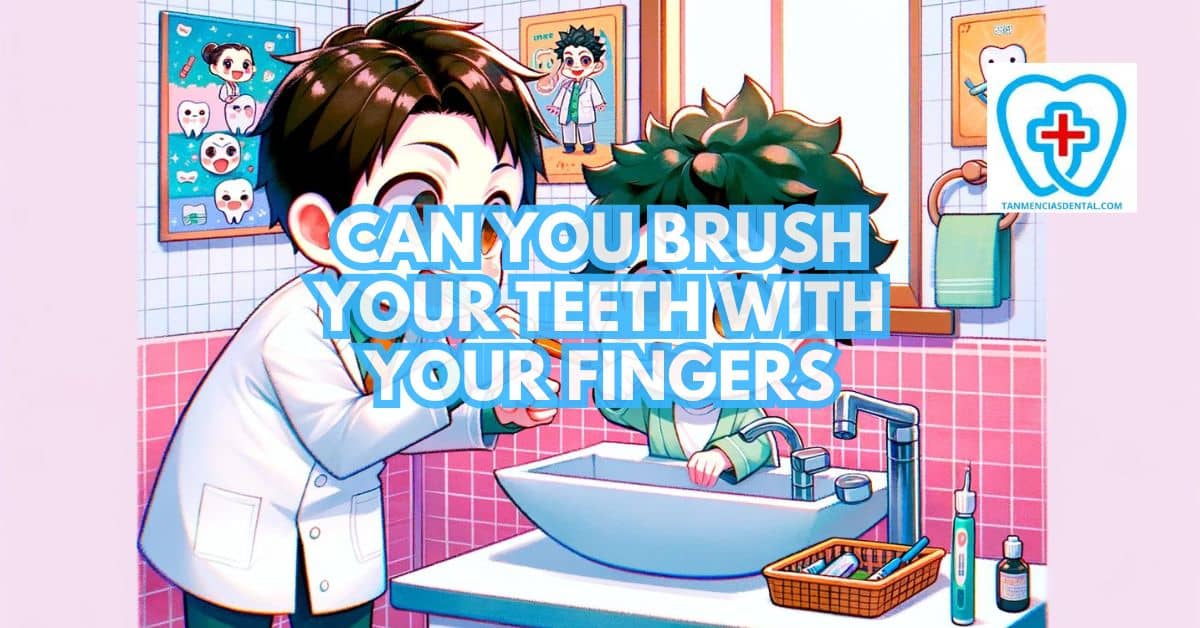Can you brush your teeth with your fingers?
The short answer is yes, but it’s not as effective as using a toothbrush.
In emergencies, finger brushing can help remove some food particles and plaque, but it won’t clean as thoroughly.
We’ll explain when it’s appropriate to use this method, how to do it properly, and why it shouldn’t replace regular brushing.
Understanding these points can help you maintain better oral hygiene when you’re in a pinch.
1. In a Pinch: Brushing Teeth with Your Fingers
There are times when brushing with your fingers might be your only option, such as when camping, during unexpected travel, or when you forget your toothbrush.
In these situations, using your fingers can help remove surface bacteria and food particles, giving your mouth a temporary sense of cleanliness.
To improve this method, wrap a paper towel around your finger to create a slightly rough surface that can better scrub your teeth.
Focus on gently rubbing each tooth and the gum line to avoid irritation.
While this makeshift technique can help in emergencies, it doesn’t replace the thorough cleaning a toothbrush provides.
Dentists recommend using finger brushing only as a short-term fix to maintain some level of dental health.
Once you have access to proper dental tools, return to your regular routine to prevent long-term issues like plaque buildup and gum disease.
🦷 How Comprehensive Dental Care Contributes to Your Overall Health and Well-Being
2. Clean Hands, Clean Teeth: Preparing for Finger Brushing
Before you consider using your fingers for teeth cleaning, it’s essential to make sure your hands are thoroughly clean.
Start by washing your hands with soap and warm water, scrubbing all surfaces, including under your nails, for at least 20 seconds.
This process helps eliminate germs and bacteria that could transfer to your mouth and cause oral health problems.
Dirty hands can introduce more bacteria, worsening issues like plaque and food buildup on your teeth.
After washing, dry your hands completely with a clean towel to avoid spreading moisture, which can carry leftover germs.
Clean hands are crucial for reducing the risk of bad breath caused by bacteria.
By taking this step seriously, you ensure that finger brushing provides a safer, more effective temporary solution.
🦷 The Ultimate Guide to Brushing Your Teeth: Unlocking the Secrets to a Healthier Smile
3. Finger Brushing vs. Toothbrush: Comparing Effectiveness
The main drawback of using your fingers instead of a toothbrush is the lack of bristles.
Bristles on a toothbrush are designed to reach into the tight spaces between teeth and along the gum line, areas your fingers simply cannot clean effectively.
This significantly reduces the overall effectiveness of cleaning your teeth, particularly in preventing plaque and tartar buildup.
Additionally, toothbrushes are designed to be ergonomic and to apply the correct amount of pressure to teeth and gums, which is hard to replicate with just your fingers.
Therefore, while finger brushing can be useful in some contexts, it does not match the cleaning power of a traditional toothbrush.
🦷 Brushing Teeth with Salt and Toothpaste: Is It Safe? The Pros and Cons Explained
4. Brushing with Toothpaste: Adding Fluoride Protection
Even when brushing with your fingers, it’s crucial to use toothpaste, especially one that contains fluoride.
Fluoride toothpaste enhances the enamel’s resistance to decay and helps repair early decay before it becomes a serious problem.
Squeeze a pea-sized amount onto your fingertip before applying it to your teeth; this ensures that you’re still getting the benefits of fluoride.
As you spread the toothpaste with your finger, try to cover all tooth surfaces to maximize contact with fluoride.
Although not as effective as a toothbrush, this method can still provide a degree of protection against cavities.
🦷 Brushing Your Teeth with Vinegar: Is It a Good Idea? The Benefits, Risks, and Alternatives

5. Finger Brushing Technique: Massaging Teeth and Gums
When brushing with your fingers, it’s important to be gentle to avoid damaging your gums.
Use a circular motion on each tooth, and massage your gums lightly to stimulate them without causing irritation.
Focus on one section of your mouth at a time to ensure thorough coverage.
This method can be soothing and help maintain gum health in the absence of a toothbrush.
Remember, the goal is to mimic the motion of a toothbrush as closely as possible to clean effectively.
🦷 The Power of Community Dental Care: How Local Clinics Are Transforming Oral Health
6. Be Careful When Brushing with Your Fingers
When brushing your teeth with your fingers, it’s important to be gentle to protect your gums from irritation.
Pressing too hard can damage the soft tissues in your mouth and cause discomfort.
Make sure your nails are trimmed and smooth to avoid accidentally cutting your gums.
Be cautious not to swallow toothpaste, especially if it contains fluoride, as it can be harmful if ingested in large amounts.
By following these safety tips, you can effectively clean your teeth while minimizing any potential risks.
🦷 The Surprising Benefits of Salt for Your Teeth: Natural Remedies for a Brighter Smile
7. Limitations of Finger Brushing: Missing Plaque
One of the significant limitations of brushing with your fingers is the inability to remove plaque effectively, especially between teeth.
Plaque that builds up in these areas can lead to gum disease and tooth decay if not addressed properly.
Fingers lack the precision and size to access the small spaces between teeth, which are critical areas for plaque removal.
This method should not be seen as a substitute for flossing, which is essential for cleaning between teeth.
Always complement finger brushing with flossing, if possible, to maintain optimal oral hygiene.
🦷 Can a Broken Tooth Cap Be Fixed? Everything You Need to Know About Repairing Damaged Crowns
8. When Finger Brushing Becomes Necessary
There are specific scenarios where finger brushing might be the only available option, such as during unexpected overnight travel, camping without access to personal items, or perhaps when recovering from an illness that limits mobility.
In such cases, maintaining oral hygiene is still important, and finger brushing can serve as a better alternative than not cleaning your teeth at all.
It’s also a useful technique for young children who are just learning about oral care, helping them get used to the idea of brushing.
Make sure that this approach is only ever used as a stopgap until more conventional approaches can be used.
🦷 Brushing Your Teeth at Work: How to Freshen Up During Your Busy Day
9. Not a Replacement: Importance of Regular Dental Care
Using your fingers to brush your teeth is not a substitute for regular dental care with a proper toothbrush and floss.
Regular dental checkups and professional cleanings are essential for maintaining oral health and preventing long-term issues like gum disease and cavities.
Dental professionals use specialized tools and techniques that go far beyond what can be achieved with finger brushing alone.
Ensuring access to a toothbrush and dental floss should always be a priority, even when traveling or in unique circumstances.
Consider finger brushing only as an emergency measure, not a regular practice.
🦷 Fixing an Overbite Without Braces: Expert Advice on Alternative Treatments
10. Rinsing After Finger Brushing: Removing Residue
After brushing your teeth with your fingers, it’s important to rinse your mouth thoroughly to remove any remaining toothpaste and loose debris.
This step is crucial to ensure that all particles are flushed out of your mouth, reducing the risk of plaque buildup.
Water is typically sufficient for rinsing, but if available, using an antibacterial mouthwash can provide additional cleaning and germ-killing benefits.
Ensure that you rinse vigorously to cover all areas of your mouth.
This practice helps maintain a cleaner oral environment until you can brush with a toothbrush.
🦷 Can You Brush Your Teeth with Salt? The Truth Behind This Popular Home Remedy
11. Brushing with Fingers: Temporary Fix, Not Long-Term
Brushing your teeth with your fingers should only be seen as a stopgap solution in unusual situations where traditional tools are not available.
It is not suitable for long-term use because it cannot provide the same level of oral hygiene as brushing with a toothbrush.
Over-reliance on finger brushing can lead to inadequate plaque removal and increased risk for oral health issues.
Always aim to transition back to using a toothbrush as soon as possible.
Remember, the health of your teeth and gums depends largely on proper and regular brushing techniques.
👨⚕️ Conclusion
While you can brush your teeth with your fingers in emergency or unavoidable situations, this method has clear limitations and should not be used as a long-term solution.
Finger brushing can temporarily maintain oral cleanliness but lacks the effectiveness of a toothbrush in removing plaque and bacteria.
Always prioritize finding and using a toothbrush as soon as you can, and continue to adhere to regular dental care routines.
Understanding these limitations will help ensure that your oral health is not compromised in challenging situations.
😊 Self-Promotion
Visit Tan-Mencias Dental Clinic in Parang, Marikina City, for top-notch dental care in a warm and welcoming environment!
Our friendly team is dedicated to providing you with the best possible oral health services.
If you have any questions or want to schedule an appointment, feel free to call us at 9171451074, send us a message through our Facebook page, or fill out our contact form on our website.
We’re here to help you achieve and maintain a healthy, beautiful smile.
Connect with us today and experience the difference at Tan-Mencias Dental Clinic!

